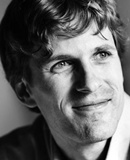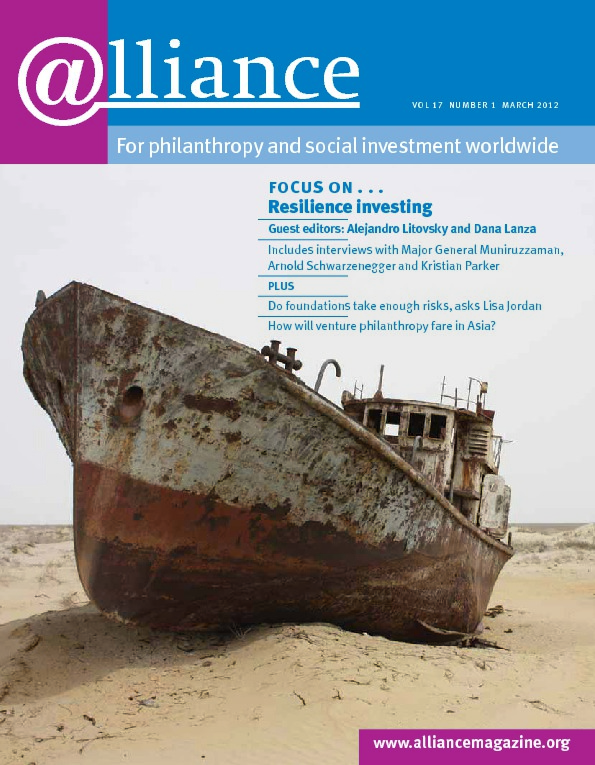Last July, Beyond Philanthropy, the for-profit affiliate of Berlin-based Active Philanthropy, and the Swiss philanthropy consultancy Social Investors Partners signed a cooperation agreement. Patrick Frick of Social Investors Partners talked at the time of ‘a new model for the charitable sector’ which would increase its effectiveness. Six months on, Caroline Hartnell talked to Patrick Frick and Felicitas von Peter of Active Philanthropy about what the partnership brings them and why they think strategic partnerships are the way ahead.
 The cooperation extends the reach and capacity of both. The bulk of Beyond Philanthropy’s work, explains von Peter, has been in Germany, but they have worked across Europe and elsewhere. ‘What we haven’t had, and Social Investors has, is staff on the ground. It has two partners who travel to Africa, Latin America and Asia, which helps both with due diligence and with project management. For Frick, the main advantage is that there was no advisory firm capable of offering advice on a wide range of thematic and geographic areas. In the independent advisory market in continental Europe, ‘you have mainly individuals or very small teams’. Both he and von Peter see a need to provide for philanthropist clients with large-scale contracts or mandates that so far no one in Europe has been equipped to deal with.
The cooperation extends the reach and capacity of both. The bulk of Beyond Philanthropy’s work, explains von Peter, has been in Germany, but they have worked across Europe and elsewhere. ‘What we haven’t had, and Social Investors has, is staff on the ground. It has two partners who travel to Africa, Latin America and Asia, which helps both with due diligence and with project management. For Frick, the main advantage is that there was no advisory firm capable of offering advice on a wide range of thematic and geographic areas. In the independent advisory market in continental Europe, ‘you have mainly individuals or very small teams’. Both he and von Peter see a need to provide for philanthropist clients with large-scale contracts or mandates that so far no one in Europe has been equipped to deal with.
‘It just seems a good combination’
Moreover, the partnership brings together a team who between them have strong networks and a wide range of skills, including language skills, expertise in facilitation, long experience working for UN organizations, a strong background in family philanthropy, experience working in a strategic advisory capacity on the board of a large foundation, and von Peter’s own seven or eight years’ history of building a peer-to-peer networking and exchange and experiential learning. ‘It just seems a good combination,’ she says.
The most important thing, however, is that they have the same target audience and the same values. Von Peter talks about how involved working with individual donors and the intricacies of their family relationships can be and how important it is to ‘understand the family as a complex system with very particular needs. This has a lot to do with passing on a legacy to the next generation about family values, tradition, what the family stands for. It was a very easy discussion with Social Investors right from the start because we had the same philosophy.’
Frick agrees that their role as advisers is not to tell clients what to do but to enable: ‘Some of our clients were literally sitting on the fence for years, stuck between so many options from around the world for them to fund; we were able to help them focus and identify the opportunities where they could make the most impact given their values and resources and the needs of society.’ Crucial to this role, says von Peter, is independence: ‘We don’t have any product to sell, and that independence gives us the freedom to take time to help people figure out what they want to do.’ Ultimately, their philosophy is to deliver the best results for the client, and it’s to the client that they are accountable.
Disagreements over the best course
What happens when the client wants to pursue a course which the adviser doesn’t think is the best use of funds? ‘It’s one of the hardest questions because as an adviser you are aware of the wide range of options for having an impact,’ says von Peter. She herself is a big fan of funding advocacy work but she concedes it’s a difficult sell because ‘you can’t see the school that you’ve built, or the 15 children that have their school certificates’. She sees that as one of the virtues of working with a client over a long period: as their engagement and experience grow, they are more likely to be open to funding things like advocacy.
Although they don’t work with people unless they want to make a positive impact on society, adds Frick, ‘it would be preposterous to pretend that an adviser always knows the best way forward. The issues we’re dealing with are way too complex for anyone to predict what will happen if you make a particular intervention. It’s much more about creating a safe space in which you can have open conversations with the client and grapple with difficult questions as best you can.’
Cooperation and capacity
Frick believes that if the philanthropy advisory market is to serve the full spectrum of philanthropists, ‘from the novice to the most sophisticated’, collaborations such as that between Social Investors and Beyond Philanthropy are critical. ‘Otherwise,’ he argues, ‘we would not, as individual players, have the complete range of services and expertise necessary to meet the diversity of needs.’
Moreover, believes von Peter, the sector is going to change over the next to five to ten years ‘towards a more integrated approach between donations and social investment’. It will become ‘a lot more interdisciplinary. The clients will want a mixed portfolio, especially the ones who are entrepreneurial, which is the majority.’ This will throw up a whole new range of legal and fiscal questions ‘and the client wants one stop, not necessarily somebody who can answer all the questions, but someone who knows how they can be answered. Clients don’t want to run around to 15 organizations; they want trusted advice, and referrals from people they trust.’
At Beyond Philanthropy, she says, they had decided against specializing in impact investment because ‘if you want to build up a real capacity inside an organization you need at least one or two specialist teams and that would be crazy for either Social Investors or us because we are more on the navigation side’. You need access to the right resources but they don’t need to be in house. ‘We want to work with others who are specialist in impact investing so we can offer the client better experience.’ Social Investors Partners, says Frick, is ‘co-located with two other companies that have large venture funds in impacting investing … we’re building around us an ecosystem and a group of individuals that truly know how to go about this.’
Von Peter concludes: ‘I think we’ll see a lot more of these strategic partnerships where you work together based on joint values and a joint approach, but you each bring complimentary assets.’
Another thing, she adds, ‘we are the tip of the iceberg. There are millions of people out there who are giving without any advice because we have not been good enough at making the point that money going into the sector can be made more efficient.’
Too many? Too bossy?
A US non-profit magazine called Blue Avocado recently suggested[1] that:
‘In the blink of 15 years, we’ve gone from a time when there was hardly any nonprofit infrastructure support to one where it feels as if the infrastructure – we coined the term Philanthropic-Consultant Industrial Complex – outweighs the nonprofits doing the actual work. Even more than the money, the philanthropic-consultant infrastructure is changing who’s running the show: rather than supporting nonprofits, foundations and consultants are increasingly telling nonprofits what nonprofits should be doing.’
Is this a picture that von Peter and Frick recognize?
It’s more a case of mediating and getting both around the table than telling non-profits what they should be doing, thinks von Peter. Previously, the NGO-donor relationship was more focused on the exchange of money. There was no real willingness to enter into a true partnership. ‘Advisers have been helping donors and NGOs engage a lot more and I think that is for the benefit of the sector overall if done in the right way.’
Frick agrees. What he calls ‘active donorship’ plays a crucial role in improving and maximizing the impact of non-profits, but this role doesn’t always come naturally to philanthropists. The adviser, he believes, can help to ‘establish a constructive relationship with the recipient and through that partnership help them to improve, insist on results and ultimately ask some tough questions. In some cases, recipients have asked us for advice based on what we have seen in other parts of the world or in other sectors. We are happy to provide any guidance that can help them maximize their impact, as it not only benefits them but also the beneficiaries they are trying to help. In the end, I think everyone benefits.’
Both rebut the idea that the philanthropy advice market is swamped. On the contrary, they both feel that, in continental Europe at least, the infrastructure is still far from where it needs to be in order to meet the needs of philanthropists. There are the very big consultants in the US, like Arabella and Rockefeller Philanthropy Advisers and FSG, and advisory services run out of banks and wealth advisers. Then there are the individual practitioners, what Frick calls the ‘Mom and Pop shops’ (‘or rather Mom or Pop shops,’ corrects von Peter). However, there are almost no medium-size philanthropy consulting practices in Europe of, say, half a dozen people. ‘I think there’s a tremendous challenge out there,’ says Frick. ‘We want to make this work but it’s a truly entrepreneurial challenge … and I think the jury is still out if we can actually create players in this space that truly matter on a larger scale.’
1 Blue Avocado Editor’s Notes, 11 November 2011: http://www.blueavocado.org/content/philanthropic-consultant-industrial-complex-editor-notes-issue-74
Felicitas von Peter is managing director of Beyond Philanthropy and managing partner of Active Philanthropy. Email vonpeter@beyondphilanthropy.eu
Patrick Frick is a co-founding partner of Social Investors Partners. Email patrick.frick@socialinvestors.com



Comments (0)